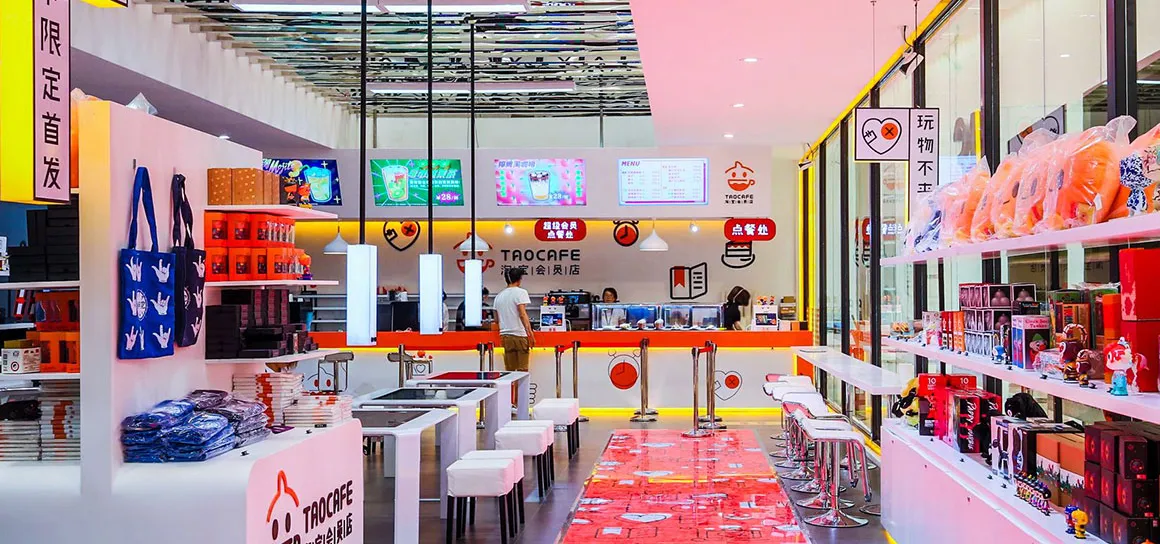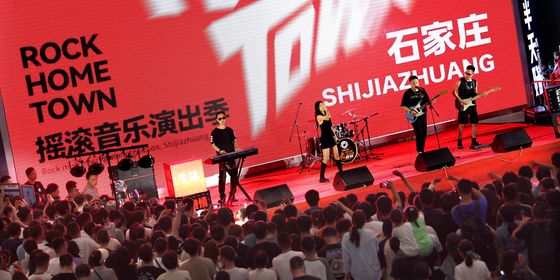Alibaba opens its first self-service store
Self-service stores are popping up all over China’s big cities—and even as some are already closing (if only temporarily), others predict that line-free offline shopping may soon become commonplace.
Last weekend saw Alibaba’s Tao Café, a staff-less store in Hangzhou, Zhejiang province, debut to long queues lured by discounts of up to 30 percent, and the “excitement” of being among the first to experience the future of high-street retail.
Alibaba’s unmanned experience is similar to pilot schemes deployed in convenience stores in cities like Beijing and Shanghai: Armed with Alibaba’s Taobao app, customers scan a QR code on a subway-like entry barrier, then browse shelves for products (limited to drinks and snacks at the moment, as well as an array of Alibaba souvenirs that feature in the store’s promotional video).
Consumers exit via a door equipped with facial-recognition technology, and the charges for what they’re carrying are deducted automatically on the app. As the video demonstrates, Alibaba have considered how things could possibly go wrong, and accounted for those who might view the stores as an invitation to indulge in five-fingered discounts (wearing a hat or sunglasses, for example, will prevent you from exiting).
Tao Café demonstrates the Internet of Things in action, according to an iFeng.com report, with its integration of identification, detection, tracking, analyzing, and transacting into one Big Data experience. Similar unmanned shops have experienced hiccups, with BingBox, a 24-hour store in Shanghai’s Yangpu district, falling victim to the recent heatwave and closing for “maintenance.”
Reporting on the Tao Café and Taobao’s Makers Festival happened to coincide with Amazon’s second—and vigorously promoted—Prime Day in China on July 11. The timing is noteworthy, not only as the two companies are fierce rivals—Alibaba has China sewn up, while Amazon continues to gobble up Western retail markets despite making few actual profits—but also because Amazon launched its own cashier-less standalone Amazon Go store over six months ago. Copycat claims are unlikely to make a dent on either Alibaba’s business model or Chinese customer preferences, though.
Living up to its name, Tao Café also allows meal orders: Customers order aloud to a screen, and fees are automatically deducted after confirmation; another screen displays pictures of each customer with their order number and wait time.
Though many will delight at the convenience and potential for growth, others express serious concern at the development. Technology and cost are among the chief concerns. “One trend of self-service store development is technology races,” said commentator Chen Jing in national tabloid Global Times. “The technology part is technically unfeasible at present.”
According to Chen, China enjoys a competitive edge over many other countries in mobile-payment software and lower costs. Once the technological issues are solved, he predicted that self-service stores could soon be as popular as shared bikes. But another issue is the impact they will have on both online shopping and the traditional retail sector, in particular unemployment—with so much automation, what will happen to China’s vast and unskilled labor market (not to mention the dwindling “competitive edge” that low-cost labour brings to China)?
Meanwhile, Swedish company Wheely has debuted a solar-powered, drone-equipped, self-driving, automated 24-hour shop called Moby in Shanghai, which promises to revolutionize shopping by doing away with expensive real estate and human cashiers. While self-driving is likely to be a contentious legal issue for tech companies in China, Wheely’s optimistic outlook overlooks some basic logistics (high traffic, poor urban planning) and the government’s history of excluding foreign tech firms in favor of homegrown replicas.
Other stores are treating the mobile-payment revolution as a high-tech, low-frills convenience: One shop in Guangzhou operates with a QR-enabled “honesty box” so shoppers can scan, pay, and go—despite lacking any fancy software, the storeowner “Zhang” reports minimal theft.
Cover image from 淘宝造物节












